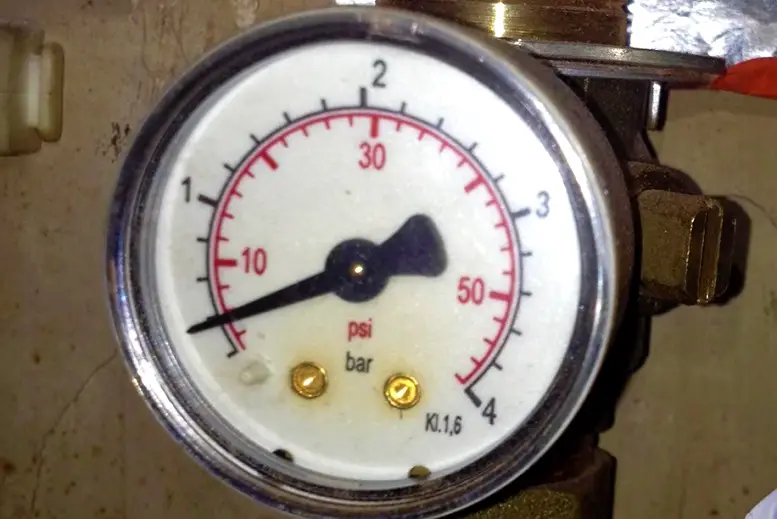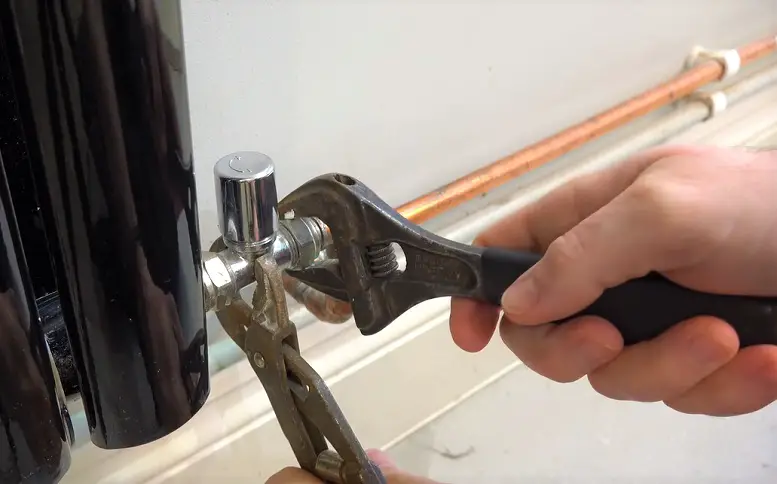| Note: This article may contain affiliate links, which means if you make a purchase following our links won’t cost you extra, but we may earn a commission. Learn more |
If your boiler loses pressure, it could be due to a leak. But, it’s not the only reason for a boiler to lose pressure.
A boiler generally has two types of pressure: high and low. The high pressure is created by the boiler when it’s operating and is needed to circulate the hot water or steam. The low pressure is the pressure of the water in the boiler itself.
If the pressure in the boiler falls below the safe limit, the boiler will automatically switch itself off as a safety measure. This is to prevent the boiler from overheating and exploding, which would obviously be extremely dangerous.
Why Does a Boiler Lose Pressure?
A boiler can lose pressure for a number of reasons besides leaks. The most common reasons are listed below, along with some tips on how to fix them.

1. Problem with the pressure relief valve
The pressure relief valve is responsible for releasing excess pressure from the boiler. If this valve becomes stuck or damaged, it can cause the boiler to lose pressure. To fix this problem, simply replace the pressure relief valve.
2. Filling loop problem
The filling loop is responsible for supplying water to the boiler. If this loop becomes damaged or blocked, it can cause the boiler to lose pressure. To fix this problem, simply replace the filling loop.
3. Leaking radiators
Radiators can sometimes develop leaks. These leaks can cause the boiler to lose pressure. To fix this problem, simply repair or replace the leaking radiator.
4. Bleeding the radiators
Radiators can sometimes become air-locked. This can cause the boiler to lose pressure. To fix this problem, simply bleed the radiator.
5. Check the water level in the boiler
The water level in the boiler should be checked regularly. If the water level drops too low, it can cause the boiler to lose pressure. To fix this problem, simply add water to the boiler.
Learn More: What Smells Like a Gas Leak But Isn’t!
How Often is It Normal for a Boiler to Lose Pressure?
It’s normal for a boiler to lose pressure over time. The rate at which it happens depends on the quality of your boiler and how well you maintain it. If you have an older boiler, you may need to add water to it every few months.
Newer models shouldn’t require this as often, but it’s still a good idea to check the pressure monthly.
Relevant: Gas Boiler Location Regulations And Position
Is It Normal for a Boiler to Lose Pressure?
Your boiler needs to have a little bit of pressure in order for it to work properly. If your boiler has lost pressure, it could be due to a few different reasons. A common reason for this is that the pressure relief valve has been activated.
This safety feature is designed to release pressure if the boiler gets too hot. Another possibility is that there is a leak in the system somewhere. Boilers can lose pressure if there is a leak in the pipes or in the tank itself.
If you think you might have a leak, it’s important to have it checked out by a professional as soon as possible.If your boiler has lost pressure, don’t panic! There are some simple things you can do to try and fix the problem yourself.
First, check to see if the pressure relief valve has been activated. If it has, simply reset it and wait for the boiler to cool down before turning it back on again. If there doesn’t seem to be any water leaking from the system, then try bleeding the radiators.
This will get rid of any air that might be trapped in the system and should help restore normal pressure levels.

How Do I Stop the Pressure from Dropping on My Boiler?
If you have a boiler with a pressure gauge, it is important to check the pressure regularly. The ideal pressure is between 1 and 2 bar. If the needle on the gauge is below this, then your boiler may be losing water and will require topping up.
There are two ways to stop the pressure from dropping on your boiler.
You can check for any leaks in the system and repair them if necessary. Also, you can bleed the radiators to remove any airlocks.
This process is simple and only requires a radiator key. If you have followed these steps and the pressure on your boiler is still dropping, then you should contact a Gas Safe registered engineer for further assistance.
Why Do I Have to Keep Topping Up My Boiler?
If you have a boiler, you know that one of the most important things you can do to keep it running properly is to keep it topped up with water. But why does a boiler need water in the first place? And why does it seem like you have to top it up all the time?
Here’s a quick rundown on why your boiler needs water and what you can do to make sure it doesn’t run low.
Why Does My Boiler Need Water?
Boilers are closed systems, meaning they don’t constantly draw in fresh water from a source like a municipal water line.
Instead, they rely on being filled up with water once and then sealing that water inside the system. That sealed-in water is then heated until it turns into steam. The steam is used to heat your home or provide hot water for things like showers and dishes.
As the steam cools, it condenses back into liquid form and returns to the boiler where it can be reheated and turned back into steam again. This process happens over and over again, 24 hours a day, 7 days a week. And as long as there’s enough water in the system, everything will run smoothly.
But if the level of water gets too low, problems can start to occur.
What Happens If I Don’t Keep My Boiler Topped Up?
If your boiler runs low on water, two things can happen: either your heating will stop working altogether or your boiler could overheat.
Neither scenario is good news during cold weather! That’s because when there’s not enough water in the system, the boiler has to work harder to heat up what little liquid is left. This puts extra strain on the appliance which could lead to a complete breakdown or an overheating incident which could cause serious damage (not to mention be quite dangerous).
How Can I Tell If My Boiler Is Low On Water?
Most boilers have an internal sensor that will detect when the level of liquid inside falls below a certain point. When this happens, an indicator light on your control panel should come on letting you know that you need to add more water ASAP!
Does Boiler Pressure Drop in Summer?
If your boiler pressure drops in summer, it’s most likely due to one of two things: either your system is losing water or air is getting into the system. If you suspect your system is losing water, check all of your valves and fittings for leaks. If everything looks tight, then you may have an issue with your expansion tank.
This is a common problem in older homes and can be easily fixed by calling a professional. If you think air might be getting into your system, again, check all of your valves and fittings. You may also want to bleed your radiators to release any trapped air.
A boiler pressure drop is usually an easy fix, so don’t hesitate to call a professional if you’re unsure what the problem is.
Can a Leaking Tap Cause Boiler Pressure to Drop?
If your boiler’s pressure gauge is showing a reading of below 1, then it’s likely that you have a leak in your system. This could be a dripping tap, which can cause your boiler pressure to drop. While a small drip might not seem like much, it can actually add up over time and cause your boiler to lose pressure.
If left unchecked, this can eventually lead to your boiler breaking down.If you think you may have a leaking tap, then it’s important to get it fixed as soon as possible. A qualified plumber will be able to quickly identify the problem and fix it before it causes any further damage to your boiler.
Is Low Boiler Pressure Dangerous?
If your boiler’s pressure is too low, it won’t be able to heat your home properly. This can be dangerous, as you may end up with cold spots in your house that could lead to serious health problems. If you think your boiler’s pressure is too low, the first thing you should do is check the manual that came with it.
Some boilers have a built-in pressure gauge, while others will require you to purchase a separate one. Once you know what the normal operating pressure for your boiler should be, compare it to the current reading. If it’s lower than usual, there are a few things you can do to try and fix the problem.
First, check all of the valves in your heating system to make sure they’re open. Next, bleed any radiators that might have air trapped in them. And, if neither of these solutions works, you’ll need to call a professional to take a look at your boiler and see what needs to be done.
Combi Boiler Losing Pressure
If your combi boiler pressure drops below 1 bar, you’ll need to repressurize it. Use a pressure gauge to check the pressure. If it’s lower than 1 bar, turn off the boiler and wait for 5 minutes before turning it back on again.
Check the pressure again after 5 minutes to see if it’s risen. Repeat this process until the pressure is between 1 and 2 bars.
Summary
If your boiler suddenly loses pressure, it could be due to a number of factors. Most commonly, a boiler will lose pressure due to a leak in the system. This can happen if a pipe bursts or there is a crack in the boiler itself.
Another common reason for pressure loss is simply that the system needs to be refilled with water. If you have an older boiler, it may not have an automatic refill feature and will need to be manually filled. Finally, if your home has recently experienced a power outage, this can also cause your boiler to lose pressure as the pump may have lost its prime and will need to be replaced.
